Tag: Empowerment
Instant Happiness
What is one small thing you could do today that would make you happy?
Wisdom for Teams #36
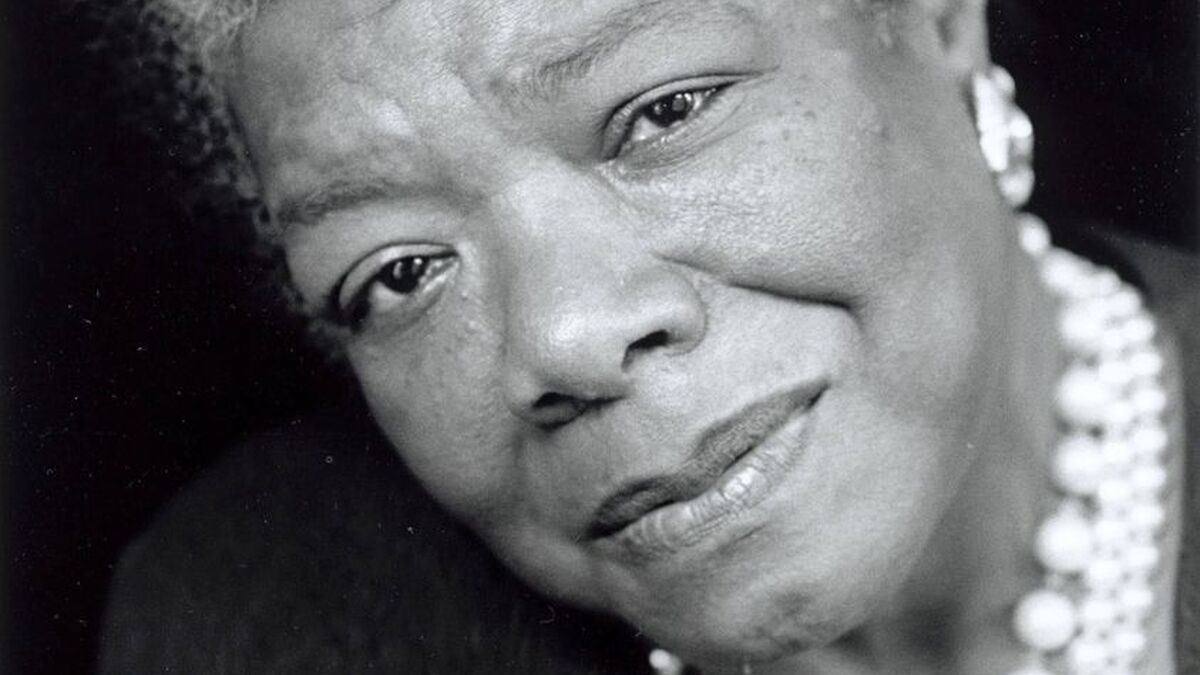
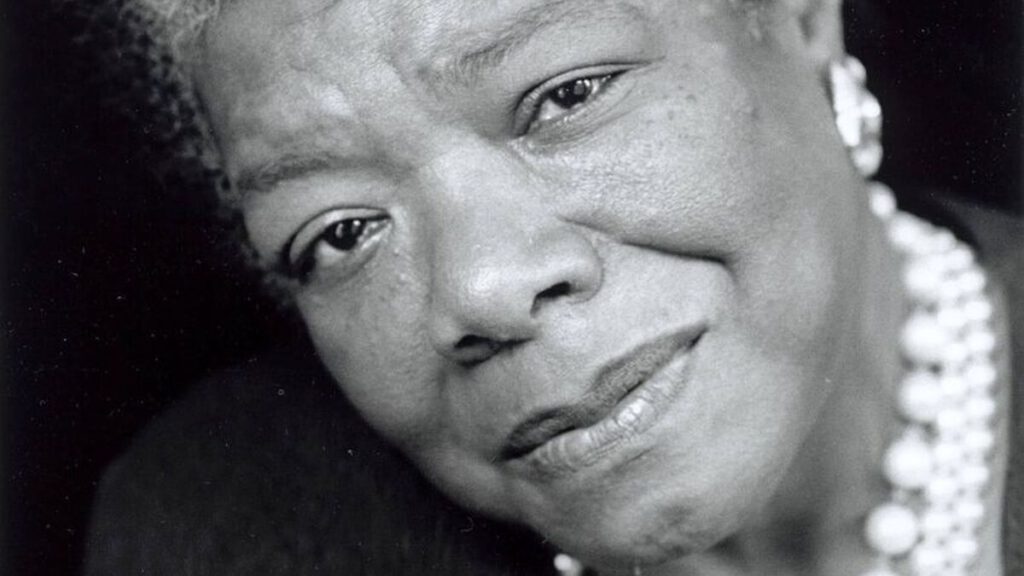
—
I can be changed by what happens to me. But I refuse to be reduced by it.
—
MAYA ANGELOU (1928 – 2014), American poet, memoirist, and civil rights activist.
Do You Own It? Or Does It Own You?


Photo by Marcus iStrfry on Unsplash
When I look at my life, I see a cliché: a rollercoaster — a few flat moments, and lots of ups and downs. For the most part, it’s been fun. But sometimes it overwhelms me, especially when things don’t roll as expected. Eventually, I realize I better get a grip.
—
What is the point of riding a rollercoaster, if you’re not going to own the experience?
—
As a coach, my job is to help people get unstuck, and that starts by them owning the experience they’re going through. As long as the experience owns us, we’re stuck and we can’t move forward.
—
Owning the experience means recognizing realistically what is happening — no more, no less — and then accepting it just as it is.
—
Only then can we figure out what to do next. Here is what I do to help myself and others own the experience.
First, frame the experience in a more constructive, less apocalyptic light. What is fact, and what is interpretation? What else could this mean? What is useful here? How could this help us grow?
Second, share the experience transparently with others. When we overcome the vulnerability of openly sharing our struggle, we dispel the power the experience has over us. As Mr. Rogers* would say, if it’s mentionable, it’s manageable.
—
Worse than the experience of feeling overwhelmed, is the experience of not owning this experience.
——
*Mr. Rogers was a TV host, author, and producer; best known for the preschool TV series “Mister Rogers’ Neighborhood”.
How’s Your Psychological Immune System?

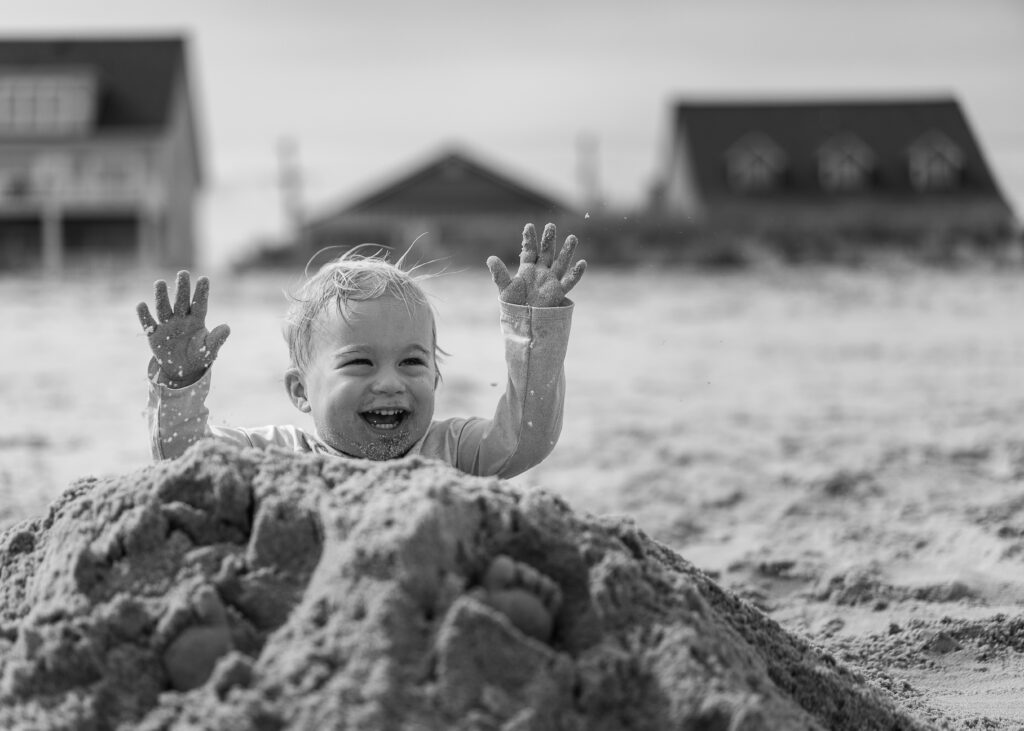
Photo by Zachary Kadolph on Unsplash
I recently listened to a guided meditation where William B. Irvine, an expert in Stoic philosophy, explained the idea of a psychological immune system. Imagine Billy, a child who grows up never being exposed to anything unpleasant, never receiving any bad news, never criticised or insulted, and always having someone solve his problems. What will happen to the adult Billy when he goes out into the world? How will he deal with setbacks?
—
Whereas the biological immune system protects us from sicknesses caused by germs, the psychological immune system protects us from the unpleasant emotions that are triggered by life’s setbacks.
—
The world is imperfect, which means shit will happen. So it seems wise to strengthen our psychological immune system in order to better deal with setbacks. How can we do this?
- Psychological vaccination: Irvine suggests we regularly use the Stoic technique of entertaining negative thoughts, like imagining losing something or someone. Or recognising that our lives could be much worse and imagining what that would look like. He says we don’t want to dwell long on these negative thoughts, but for it to be flickering moments. These thoughts work like a vaccine, preparing our psychological immune system for life’s setbacks. Another Stoic technique he recommends is called “the last time”. I talk about it in this video here.
- Psychological exposure: Another way to develop our psychological immune system is to expose ourselves to “germs”. This means deliberately moving out of our comfort zone, and doing things that are physically and/or emotionally uncomfortable. For some people, karaoke in front of a big crowd will do the trick.
—
In what shape is your psychological immune system? A good measure is how often you feel outraged or lose control to anger. Another is the average mood of your mind. Is it tranquility and confidence, or agitation and anxiety?
—
It’s naive to think we’ll live without setbacks. Preparing for them by strengthening our psychological immune system is the wise thing to do.
Why Does Anger Make Us Angry? Is Sam Harris Wrong?


Photo by Uriel Soberanes on Unsplash
When anger gets the best of us, we can easily get angry at ourselves and others. What is happening here? In essence, we’re judging our emotions. We consider some good and some bad; some positive and some negative, some acceptable and some not.
In a decade of training teams in organisations, I’m yet to meet someone who does not consider anger to be negative. Even renowned experts in the field, like philosopher and neuroscientist, Sam Harris, consider anger a negative emotion.
—
We get angry at anger because we think it’s negative. Is it?
—
I’ve been following Sam closely for the past three years through Waking Up and some of his publications. He’s got an amazing mind. I am thankful for his dedication to helping us live better lives. On the issue of anger being a negative emotion, I think there is a distinction to be made.
Some emotions may be unpleasant, but does that make them negative? What would happen if we did not feel disgust at the smell of milk gone bad? What would happened if we did not feel fear when startled by a spider? These emotions, though unpleasant, avoid a great deal of pain and sometimes even death.
—
Not all unpleasant emotions are negative.
—
When emotions have a purpose we are better off labelling them as pleasant or unpleasant rather than positive or negative. Does anger have a purpose? Anger prepares us to fight off threats. It gives us energy and determination to face the threat so as to ensure our wellbeing.
It is true that our brain has not evolved at the speed of our civilisation. This means that we can sometimes feel anger in situations where our life is not being threatened. The question then becomes: How do we deal with anger in order to reach a desirable outcome?
—
What is sometimes negative is the way we deal with anger.
—
When we react to our anger, instead of responding to it, chances are the outcome will be undesirable. Responding means recognising the presence of the emotion, identifying what might be triggering it and addressing the issue so as to reach the most desirable outcome.
Let me be clear: I OFTEN fail to respond in a desirable way. Other times, I do manage anger in the direction of desirable outcomes. Either way, I cannot see how thinking of anger as a negative emotion in-and-of itself will help. On the contrary.
—
Thinking anger is negative is the first step to turning an unpleasant emotion into an undesirable outcome.
—
One the tenets of meditation traditions, from Zen to Stoicism, is equanimity, the ability to keep cool, especially in difficult situations. These traditions suggest we are closer to equanimity when we accept things for what they are without judging them.
When we accept anger for the unpleasant emotion it is and appreciate the important albeit limited role it plays, we might be closer to the desirable outcomes we aspire to.
3 Hacks to Manage Mess in Life
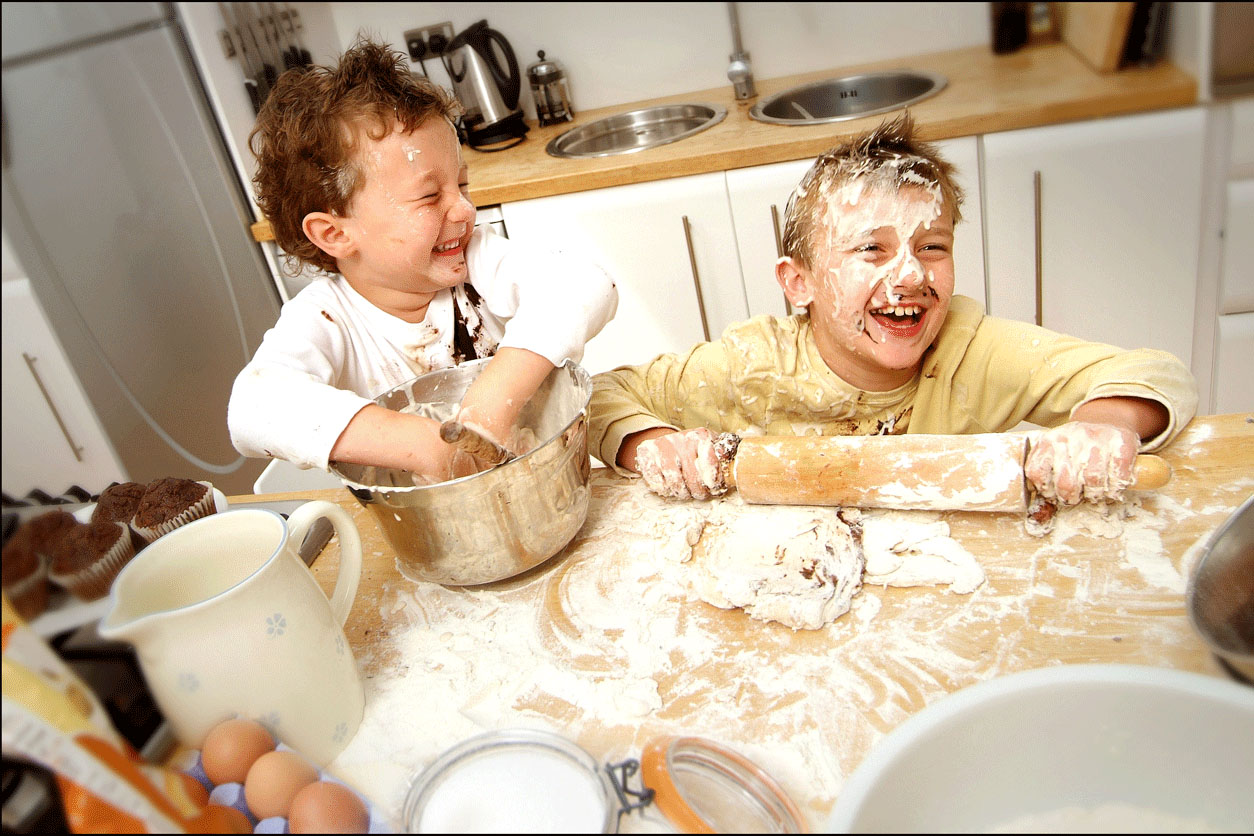

—
On Friday I gave an online workshop for Amazon’s Recruiting Team for Europe, the Middle East and Africa. It was about self-care and self-investment, and my premise was that any life worth living will regularly get messy just like the kitchen gets messy when we use it.
The key then to wellbeing is not to try avoid the mess, but to care and invest in ourselves so as to be emotionally fit when the mess happens. I shared with them several shortcuts for emotional fitness. Here are three that require little effort but have a massive, massive, massive impact in our wellbeing.
- Sleep: Matthew Walker, sleep expert and author of the book “Why We Sleep”, recommends we give ourselves the opportunity of 7 to 9 hours of sleep every night. He says that the pillars of a healthy body are not diet, exercise and sleep, but just diet and exercise, because sleep is the foundation.
- Gratitude: It’s very difficult, if not impossible, to feel grateful and at the same time anger, fear or sadness. Gratitude energizes us to deal with life’s challenges. This is why I recommend starting the day by bringing to mind a few things we can be grateful for, and to connect with the emotions that this generates. This will set us up to deal with what comes our way during the day.
- Hanging out with TRUE friends: There is a growing body of evidence about the vital role of friendship in overcoming challenges. Introverts or extraverts, we are all social beings. Helen Keller said that she would rather walk with a friend in the dark, than alone in the light. The Beatles nailed it when they suggested we get by with a little help from our friends.
Life will always give us challenges that require we reinvent ourselves. Things will break down. People will let us down.
The key to a balanced life lies in being ready for these inevitable events, for any life worth living is a messy life.
An Exercise to Prepare for Confinement
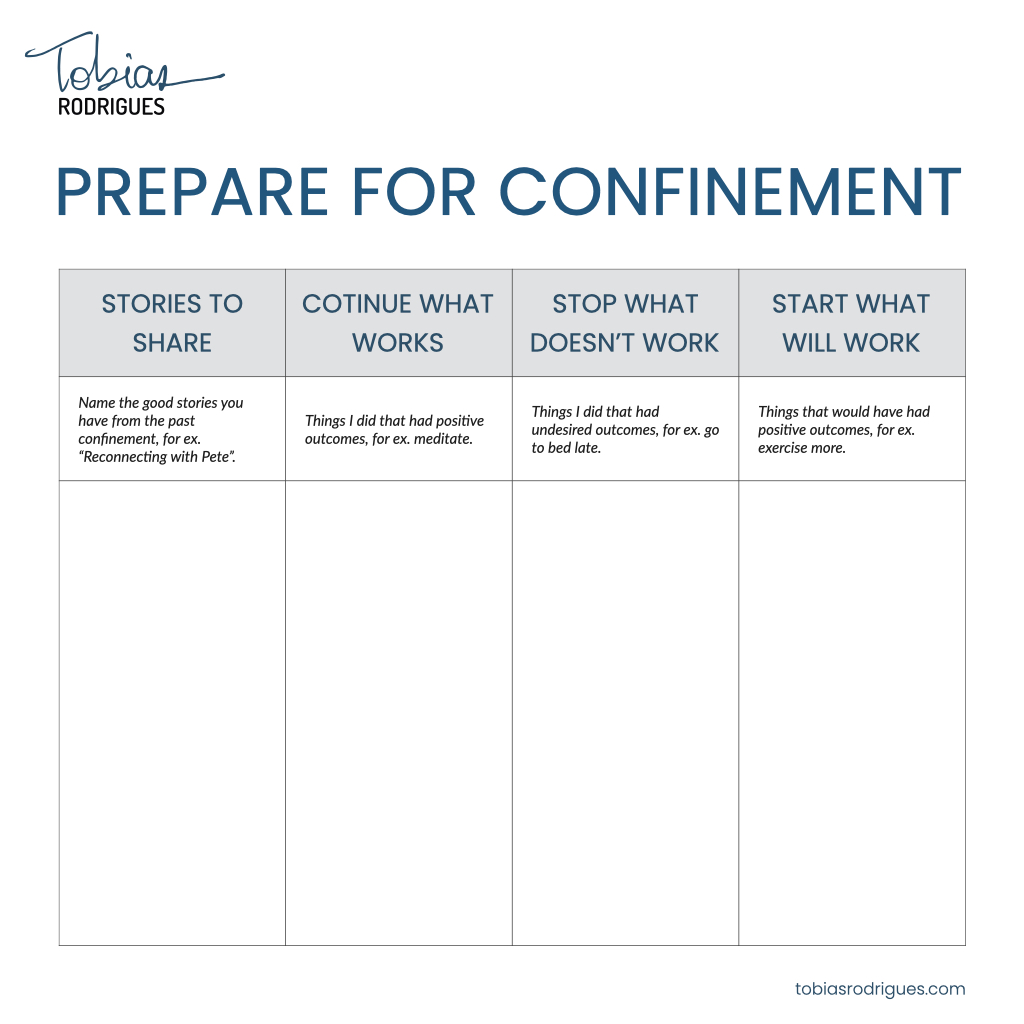
Winter is coming (for some of us) and with it the likelihood of another confinement (in one form or another). It would be dumb not to prepare. This is what I’m doing.
Three Steps
Step 1: Take some time alone to fill in the template below. Ask family and friends to do the same, especially those who will be spending more time with you.
Step 2: Come together in a celebrative spirit to share your findings.
Step 3: Decide what you will commit to. Focus on what requires low effort but has a high impact for you and those around you.
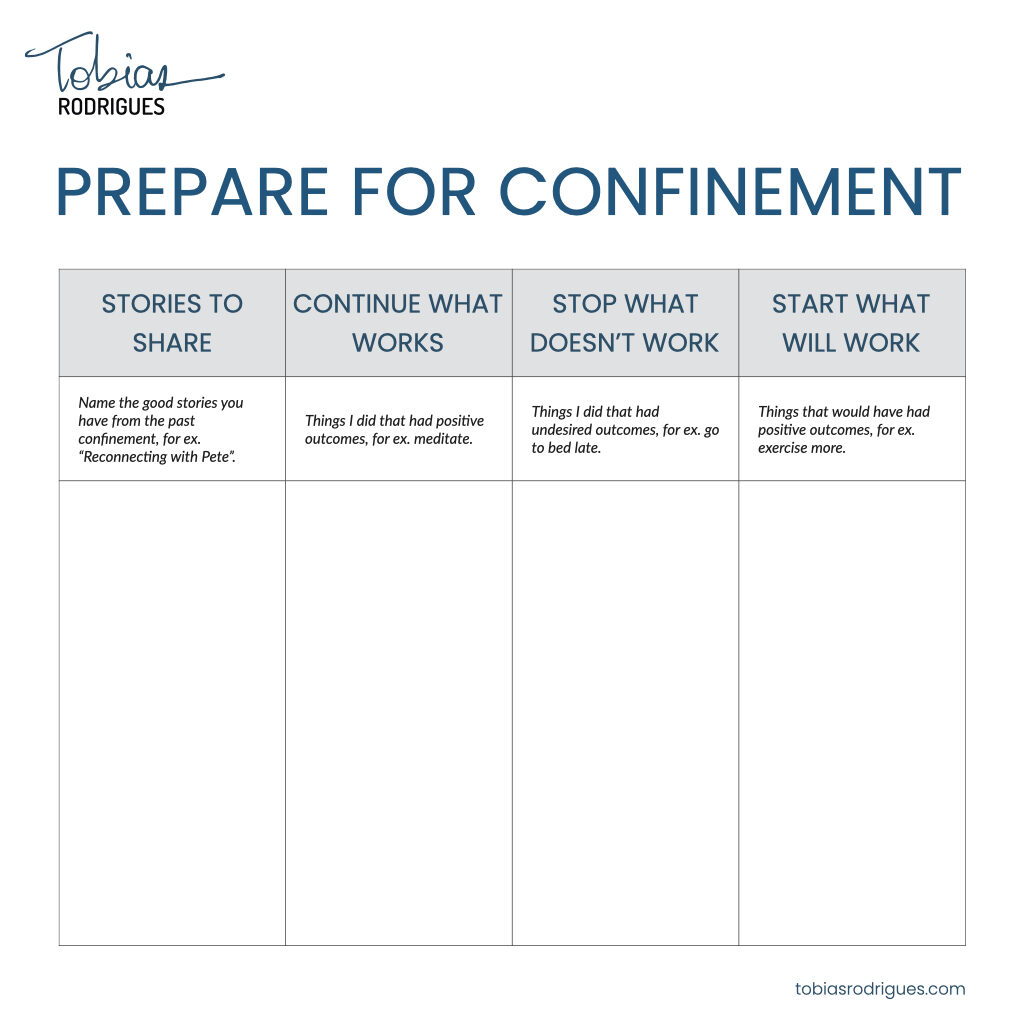
—
Would love to know what works best for you. Please share your results.
Wisdom for Teams #5

“When we are no longer able to change a situation,
we are challenged to change ourselves.”
VICTOK FRANKL (1907-1997), Austrian neurologist and psychiatrist, a Holocaust survivor, and author of “Man’s Search For Meaning“
—

Wisdom for Teams #3

“The person is not the problem.
The problem is the problem.”
MICHAEL WHITE (1948–2008), Australian social worker and family therapist, founder of Narrative Therapy
—

Wisdom for Teams #2

“The good listener doesn’t moralise. They know their own minds well enough not to be surprised or frightened by strangeness. They know how insane we all are. That’s why others can feel comfortable being heard by them.”
From the article “Charm” on the website The School of Life
—


